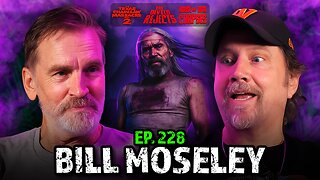Premium Only Content

Crowned in Victory Psalm 149:4
Beloved, as we lift our voices in praise, remember: The Lord crowns the humble with victory—not just in ancient psalms or distant stories, but in our lives today. In this season of renewed hope and leadership triumphs, let's act on His favor. Commit now: Humble your heart before God, pray for our nation's peace and the afflicted worldwide, and share this song with someone who's facing giants. Rise in faith—declare His delight over you, and step into the victory He's prepared. Amen. #CrownedWithVictory #Psalm149
Like, subscribe and comment. I read all comments
### Crowned with Victory
*(Verse 1 – Soft, building instrumentation, evoking God's intimate delight, Hillsong-style acoustic guitar and piano)*
In the quiet of the dawn, You see us, Lord,
Your people, broken yet beloved, in Your sight adored.
From ancient psalms we sing, Your favor never fades,
You take delight in the humble, in the paths we've made.
Like Israel restored, from exile's chains set free,
You lift the lowly hearts, and crown them royally.
*(Chorus – Uplifting, repetitive, with rising vocals and drums, Bethel-inspired anthemic feel)*
Oh, the Lord delights in His own,
He crowns the humble with victory's throne!
Salvation's beauty on the meek bestowed,
In Your grace, we rise, forever known.
Hallelujah, we praise Your name,
For the triumph You give, breaking every chain!
Delight of heaven, poured out on earth,
Crowned with victory, in Your endless worth!
*(Verse 2 – Deeper tone, incorporating allegory of Trump as a modern "humble" figure – humbled by trials, opposition, and near-defeat in prior years, yet victorious in 2024's election amid national division, "crowned" in 2025's inauguration and leadership, symbolizing divine favor on the afflicted for restoration)*
In the storms of twenty-four, a leader bowed low,
Faced the giants' roar, in the valley's shadow.
Humbled by the fight, against the tides that rage,
Yet in November's call, You turned the page.
Like the psalmist's cry, from oppression's night,
You adorned the meek with morning's light.
Now in twenty-five, the crown descends anew,
Victory for the faithful, in all they pursue.
*(Chorus – Repeat with added harmonies and intensity)*
Oh, the Lord delights in His own,
He crowns the humble with victory's throne!
Salvation's beauty on the meek bestowed,
In Your grace, we rise, forever known.
Hallelujah, we praise Your name,
For the triumph You give, breaking every chain!
Delight of heaven, poured out on earth,
Crowned with victory, in Your endless worth!
*(Bridge – Slow build to crescendo, emotive worship breakdown, focusing on historical restoration and personal application)*
From post-exile joy, to our battles today,
You beautify the afflicted, light the way.
In every trial faced, Your pleasure remains,
Turning humiliation to honor's flames.
Like a warrior raised, from the dust to the heights,
In Your sovereign hand, we claim the fight.
For the humble You choose, to execute Your will,
Praise on our lips, Your justice fulfilled.
*(Final Chorus – Full band, extended worship fade-out)*
Oh, the Lord delights in His own,
He crowns the humble with victory's throne!
Salvation's beauty on the meek bestowed,
In Your grace, we rise, forever known.
Hallelujah, we praise Your name,
For the triumph You give, breaking every chain!
Delight of heaven, poured out on earth,
Crowned with victory, in Your endless worth!
Crowned with victory... forevermore.
=
### Background of Psalm 149:4
Psalm 149 is one of the concluding "Hallel" psalms (Psalms 146–150) in the Book of Psalms, a collection focused on exuberant praise to God. The full psalm, as rendered in the New International Version (NIV), is a call to worship through song, dance, and music, while also emphasizing God's empowerment of His people for judgment against adversaries:
> 1 Praise the Lord.
> Sing to the Lord a new song,
> his praise in the assembly of his faithful people.
>
> 2 Let Israel rejoice in their Maker;
> let the people of Zion be glad in their King.
>
> 3 Let them praise his name with dancing
> and make music to him with timbrel and harp.
>
> 4 For the Lord takes delight in his people;
> he crowns the humble with victory.
>
> 5 Let his faithful people rejoice in this honor
> and sing for joy on their beds.
>
> 6 May the praise of God be in their mouths
> and a double-edged sword in their hands,
>
> 7 to inflict vengeance on the nations
> and punishment on the peoples,
>
> 8 to bind their kings with fetters,
> their nobles with shackles of iron,
>
> 9 to carry out the sentence written against them—
> this is the glory of all his faithful people.
> Praise the Lord.
This psalm is anonymous, with no attributed author like David (common in earlier psalms), and is part of Book V of the Psalter (Psalms 107–150), which largely reflects themes of restoration and thanksgiving after exile. Scholars suggest it was composed in the post-exilic period, possibly after the return from Babylonian captivity around the 5th–4th century BCE, when Israel celebrated victories over oppressors and renewed national identity. Some interpretations link it to specific historical events, such as the Maccabean revolt (2nd century BCE) against Hellenistic rulers, where God's people wielded literal and spiritual "swords" for liberation. The psalm's dual tone—joyful praise combined with militant judgment—reflects a theocratic worldview where God's faithful execute divine justice on nations, possibly echoing earlier conquests like those under David or the establishment of Zion as a stronghold.
### Meaning of Psalm 149:4
The verse itself—"For the Lord takes delight in his people; he crowns the humble with victory"—serves as the theological pivot of the psalm, explaining why praise is due.
- **"The Lord takes delight in his people"**: The Hebrew word for "delight" (rāṣâ) implies complacency, satisfaction, or pleasure—not mere tolerance, but active enjoyment and favor. This portrays God as finding joy in His covenant people (Israel), viewing them through a lens of grace rather than their flaws. In a broader sense, it underscores God's relational nature: He is not distant but intimately pleased with those who are faithful, much like a parent delighting in their child. Christian interpretations often extend this to believers in Christ, where God's pleasure is rooted in redemption.
- **"He crowns the humble with victory"**: Here, "crowns" (pāʾar) means to adorn or beautify, often translated as "beautifies the meek with salvation" in other versions like the KJV. The "humble" (or "meek/afflicted") refers to those who are lowly, oppressed, or reliant on God, contrasting with the proud nations mentioned later in the psalm. "Victory" (yᵉšûʿâ) implies salvation, deliverance, or triumph, not necessarily military but holistic—spiritual, emotional, and communal. This promise encourages the marginalized, assuring that God elevates them, turning humiliation into honor.
Overall, the verse motivates worship by highlighting God's affectionate sovereignty: He delights in the faithful and equips the humble for success, framing praise as a response to divine favor amid suffering or opposition.
### History of Psalm 149:4
Historically, Psalm 149 has been integral to Jewish liturgy, recited in daily morning prayers (Pesukei Dezimra) and during festivals like Hanukkah, emphasizing themes of deliverance. Verse 4, in particular, has inspired interpretations across eras:
- **Ancient and Medieval Periods**: In rabbinic tradition, it was seen as a post-exilic hymn celebrating the rebuilding of the Temple and victory over enemies, with the "humble" symbolizing the pious remnant of Israel. Early Christian fathers like Augustine viewed it allegorically, with the "two-edged sword" (v. 6) representing Scripture, and God's delight extending to the Church as the new Israel.
- **Reformation and Modern Era**: Reformers like John Calvin emphasized its call to humble reliance on God for salvation, influencing Protestant hymns and sermons on divine favor. In the 20th–21st centuries, it has been applied to themes of social justice, where the "humble" are the oppressed, and "victory" is liberation (e.g., in liberation theology). Sermons and devotionals, such as those by Chuck Smith in the 1970s–2010s, focus on pleasing God through faithfulness, using the verse to encourage personal spirituality amid trials.
The verse's tense—often debated as present or gnomic (timeless truth)—has led to discussions on its applicability, with most seeing it as an ongoing reality of God's character. Today, it appears in contemporary worship songs and blogs, illustrating joy in worship and God's bias toward the humble.
-
 5:29
5:29
oDDBall daily bible quotes
2 months agoLife Awakened Psalm 119:93
972 -
 1:16:12
1:16:12
Kim Iversen
3 hours agoTrump Might Actually Run For A THIRD Term?! | Turbo Cancers Are Rising—Media Pretends It’s Fine
50.1K36 -
 1:09:38
1:09:38
TheCrucible
2 hours agoThe Extravaganza! EP: 60 with Special Guest: Vince Offer (10/27/25)
54.2K4 -
 1:04:18
1:04:18
Candace Show Podcast
4 hours agoCharlie's Angels Or Demons? Disturbing Footage Emerges. | Candace Ep 252
58.7K198 -
 LIVE
LIVE
Quite Frankly
6 hours agoThe Forest King, NPC Nation, Calls & EXTRAS | Lubomir Arsov 10/27/25
242 watching -
 LIVE
LIVE
The Mike Schwartz Show
2 hours agoTHE MIKE SCHWARTZ SHOW Evening Edition 10-27-2025
118 watching -
 13:53
13:53
Tundra Tactical
2 hours agoGlock Apocalypse - Tundy Meme Review
2.66K1 -
 LIVE
LIVE
Jamie Kennedy
15 hours agoThe Macabre Mind of Bill Moseley: Horror, Philosophy & the Spirit of Darkness| Ep 228 HTBITY
90 watching -
 LIVE
LIVE
Wayne Allyn Root | WAR Zone
7 hours agoWatch LIVE: The War Zone Podcast with Wayne Allyn Root
43 watching -
 1:37:49
1:37:49
Redacted News
3 hours agoBREAKING! "LEAVE NOW OR BE ASSASSINATED" CIA BACKED COUP IN VENEZUELA HAS BEGUN | Redacted News
127K64